You may have seen your cat licking lips and wondered why she is doing it.
Cats have many adorable habits and behaviors, but not all traits are normal and often indicate something is wrong.
Cats lick their lips for various reasons. However, a cat continuously licking her lips is a cause for concern, and a visit to the vet is essential.
Here we look at the cat's tongue, why cat's lick their lips and when you should be worried.

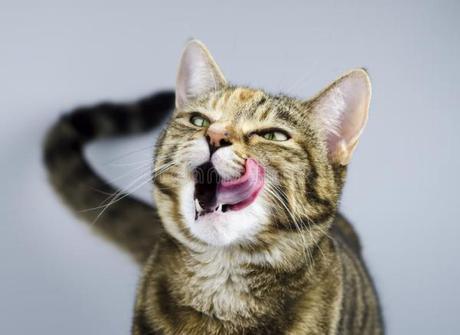
Cat Licking Lips - Why Is My Cat Licking Her Lips?
If your kitty has ever licked you, you may have noticed her tongue's rough, sand-paper like texture.
The rough bits on a cat's tongue are called papillae, which are tiny backwards-facing hooks designed to perform essential functions like pulling the meat off bones and grooming.
A drawback of this papillae is that everything your cat gathers on her tongue, like loose hair, debris and dirt, is swallowed and often ends up as hairballs.
Also, if your cat has a foreign body in her mouth, like a piece of string, it is difficult for her to spit it out and remove.
Is it OK if my cat licking lips occasionally?
If your cat licks her lips now and again, there is no need to worry.
After eating, a cat will groom herself rigorously with her tongue, licking her lips first, before grooming the rest of the body.
As a hunter, cats must remove any traces of food or blood to keep more significant predators away as the hunter becomes the hunted.
Do cats lick their lips if they are nervous or stressed?
Cats are solitary hunters whose main priority is self-preservation and will always choose flight over fight.
Cats lick their lips if they are nervous or stressed.
Other signs include:
- Urinating outside litter box
- Diarrhea or Constipation
- Lack of appetite
- Excessive grooming
- Excessive scratching
- Excessive vocalization
- Hiding
- Aggression
- Lethargy
Reasons a cat may be nervous or stressed are:
- Lack of socialization
- Traumatic experience
- A new addition to the family home, e.g. a new baby or pet
- Disruption such as moving
- Illness or injury
For a cat who is nervous, place a carrier or a cardboard box with comfortable bedding in the corner of a room as a safe retreat, with her food, water and litter tray nearby.
Also, providing high platforms like cat trees will offer your kitty more security.
Always leave a hiding cat in peace, allowing her to relax and emerge when she wishes.
Why does my cat lick her lips when travelling by car?

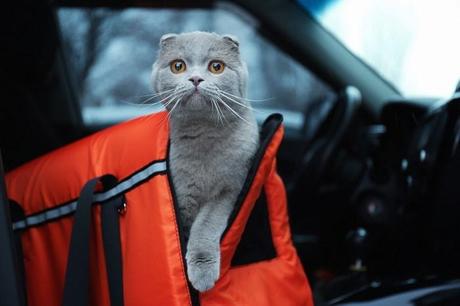
Cats lick their lips due to motion sickness. This condition affects most cats and is mainly due to the feline's highly sensitive inner ear system that makes them feel dizzy when the car is moving.
Your cat may also lick her lips due to anxiety, associating car travel with a bad experience like going to the vet.
A cat suffering from motion sickness will display the following signs:
- Drooling
- Vomiting
- Trembling
- Restlessness
- Frequent urination/bowel movements
If your kitty suffers from motion sickness, there are a few ways you can help her.
Get her used to the carrier she will travel in at home before taking her on some short journeys in the car, having her face forward.
Also, speak to your vet about medications available for motion sickness.
Why does my cat keep licking her lips?
If your cat is continuously licking her lips, it is a clear sign that all is not well and is usually a symptom of a health issue. It is essential that you take her to the vet as soon as possible.
Here we find out some of the reasons why a cat licks her lips excessively.

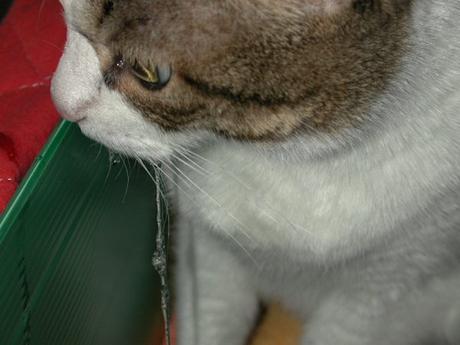
Ptyalism is where a cat salivates excessively and is also known as hypersalivation. Lip licking is associated with this disorder.
Compared to dogs, it is not normal for cats to drool and indicates a serious medical condition.
Other symptoms your cat might display include:
Possible causes of ptyalism in cats are:
- Mouth disease and tooth decay
- Foreign body
- Poisoning
- Rabies
- Kidney failure
- Oral cancer
- Respiratory condition
- Nausea
- Medication
Your vet will carry out a thorough oral examination of your cat's mouth, assessing her overall health, and will conduct further diagnostic tests if nothing found.
Treatment will depend on the primary cause of the condition.
As a cat owner, it is possible to prevent some causes of ptyalism by carrying out routine dental health care, keeping poisons away from your cat such as household cleaning products and vaccinating against rabies.
Also, take a senior cat for regular check-ups with the vet, so any conditions are detected early.

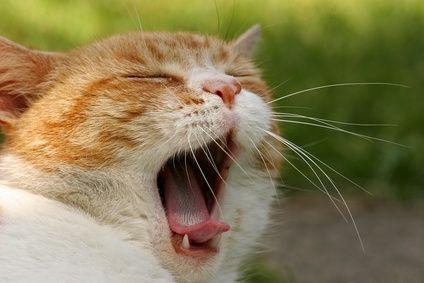
Xerostomia is a lack of saliva, resulting in a dry mouth, tongue, gums and teeth causing your kitty to keep licking her lips.
Other symptoms include:
- Bad breath
- Difficulty chewing and swallowing
- Inflamed or infected oral tissues
Possible causes of a dry mouth are:
- Renal failure
- Diarrhea
- Dehydration
- Medications
- Ageing
- Chemotherapy
- Chronic liver disease
- Dental health issues
Depending on the health issue, you can manage a dry mouth by:
- Ensuring your cat drinks plenty of water
- Routine use of specially designed pet mouthwashes
- Regular dental cleaning by the vet every six months
- Daily tooth brushing
- Provide food with high water content
- Pilocarpine oral solution prescribed by the vet
- Lowering dose or changing medications as advised by the vet

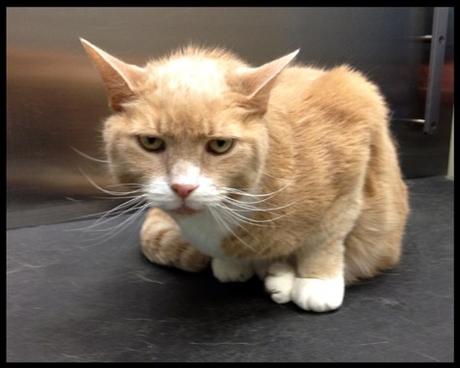
There are many causes of cat nausea, and sometimes it is a symptom of another condition.
As well as licking her lips constantly your cat may show other signs:
- Drooling
- Heavy breathing/panting
- Retching
- Vomiting
- Trembling
- Restlessness
- Nervous behaviour
Possible causes of nausea are:
Treatment depends on the assessment of your cat's health by the vet and the cause of nausea or vomiting.
It is crucial for a cat with nausea to stay hydrated, limiting their food intake.
Hairballs are a common cause. There are specific treatments you can use to help this, along with regular brushing of the coat to remove loose hairs from your cat, so they don't all go in the mouth when grooming.
As a caring cat owner, it is vital that you observe your kitty often, so it is easier to notice when something is wrong.
If your cat is licking her lips frequently, take her to the vet straight away as it is usually a sign of a serious condition or illness.

